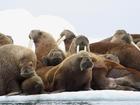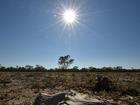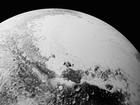A tiny invisibility cloak has been invented by U.S. scientists who are edging ever-closer to a real version of what has until now been a staple of science fiction, researchers said Thursday.
The cloak, described in the journal Science, is microscopic in size but could conceivably be scaled up in the future, according to physicists at the U.S. Department of Energy's Lawrence Berkeley National Laboratory and the University of California, Berkeley.
 Full Story
Full Story
Air pollution is killing 3.3 million people a year worldwide, according to a new study that includes this surprise: Farming plays a large role in smog and soot deaths in industrial nations.
Scientists in Germany, Cyprus, Saudi Arabia and Harvard University calculated the most detailed estimates yet of the toll of air pollution, looking at what caused it. The study also projects that if trends don't change, the yearly death total will double to about 6.6 million a year by 2050.
 Full Story
Full Story
Space station astronaut Scott Kelly is halfway home.
Kelly marked the midway point of his yearlong space mission Tuesday. He's sharing the voyage with Russian cosmonaut Mikhail Kornienko; the two experienced fliers arrived at the International Space Station in March and won't return to Earth until next March.
 Full Story
Full Story
The U.S. Fish and Wildlife Service has declined for now to create artificial floating platforms for Pacific walrus that come ashore in Alaska because they lack summer sea ice.
The agency's decision came in response to a suggestion by a wildlife advocacy group to place experimental rafts over a prime Chukchi Sea feeding area 100 miles off Alaska's coast, Geoffrey Haskett, Alaska regional director for the U.S. Fish and Wildlife Service, said in a letter Monday.
 Full Story
Full Story
Populations of marine mammals, birds, reptiles and fish have dropped by about half in the past four decades, with fish critical to human food suffering some of the greatest declines, WWF warned Wednesday.
In a new report, the conservation group cautioned that over-fishing, pollution and climate change had significantly shrunk the size of commercial fish stocks between 1970 and 2010.
 Full Story
Full Story
Halfway into a year in space -- the longest ever attempted at the International Space Station -- American astronaut Scott Kelly said Monday he misses fresh air but is adapting well.
Kelly and Russian cosmonaut Mikhail Kornienko agreed to double the length of a typical astronaut's mission at the ISS in order to help the world's space agencies study how long-term space travel affects the human body and mind.
 Full Story
Full Story
Malaysian authorities on Tuesday ordered school closures in Kuala Lumpur and neighboring states as worsening haze from Indonesian forest and agricultural fires enveloped the capital in a smoky grey shroud.
Air quality in Malaysia and Singapore has steadily deteriorated over the past two weeks due to the smog from nearby regions of Indonesia, which on Monday declared a state of emergency in a particularly hard-hit province.
 Full Story
Full Story
The operator of Japan's Fukushima on Monday began releasing previously radioactive groundwater from the crippled nuclear plant into the sea, saying a filtration process had made the discharge safe.
Tokyo Electric Power Co (TEPCO), which operates the plant in eastern Japan, said that on the first day it had released 850 tons of groundwater, which had become radioactive after flowing near the plant.
 Full Story
Full Story
Man-made global warming is set to produce exceptionally high average temperatures this year and next, boosted by natural weather phenomena such as El Nino, Britain's top climate and weather body said in a report Monday.
"It looks very likely that globally 2014, 2015 and 2016 will all be amongst the very warmest years ever recorded," Rowan Sutton of the National Centre for Atmospheric Science, which contributed to the report, told journalists.
 Full Story
Full Story
New, high-resolution images of the surface of Pluto beamed from NASA's New Horizons spacecraft reveal unparalleled geographical variety -- from soaring mountains to sand dunes to frozen ice floes, scientists said Saturday.
"Pluto is showing us a diversity of landforms and complexity of processes that rival anything we've seen in the solar system," said Alan Stern, principal investigator with the Southwest Research Institute in Boulder, Colorado, who is playing a key role analyzing data sent by the probe.
 Full Story
Full Story



